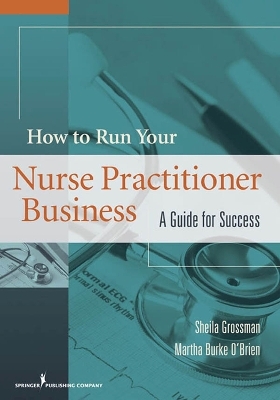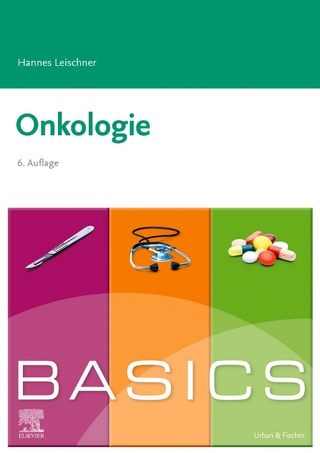
How to Run Your Own Nurse Practitioner Business
Springer Publishing Co Inc (Verlag)
978-0-8261-1762-5 (ISBN)
The authors delineate the scope and role of the NP, the changing vision of healthcare delivery and its impact on NPs, and an analysis of the impact of statutes and legislation on NP-run practices. The book also provides a review of entrepreneurial models of NP delivery settings.
Key features:
Provides templates of policies, procedures, and documents that readers can adapt for their own settings regarding referral, release of healthcare information, and mission statements
Discusses all aspects of running a clinic, such as on-call scheduling, job descriptions, staff evaluation, managing patient records, collaborative practice agreements, business plans, and sample budgets
Offers important information about patient safety, evidence-based practice, working with business consultants to develop a practice, financial management of a practice, explanations of the roles of the director/owner and other providers
Sheila Grossman, PhD, FNP-BC, APRN, is a Professor of Nursing and Coordinator of the Family Nurse Practitioner Track at Fairfield University School of Nursing. She received a BS in nursing from the University of Connecticut, her MS as a Respiratory Clinical Nurse Specialist from the University of Massachusetts/Amherst, a postmasters degree as a Family Nurse Practitioner from Fairfield University, and her PhD from the University of Connecticut. She has worked many years as a clinician on a variety of medical, surgical, and critical care units and presently practices as a Family Nurse Practitioner in a primary care clinic. She is the coauthor of The New Leadership Challenge: Creating A Preferred Future for Nursing, which is in its third edition (2009), has received an AJN Book of the Year Award for Mentoring in Nursing: A Dynamic and Collaborative Process (2007), and coauthored Gerontological Nurse Certification Review in 2008. She is the author of multiple chapters and journal articles on leadership, mentoring, gerontology, adult health, and palliative care. Her research interests focus on symptom management in palliative care, leadership, pedagogy, cultural competence, and adult patient outcome studies. She is active in Sigma Theta Tau International Honor Society, American Association of Critical Care Nurses, National Organization of Nurse Practitioner Faculty, American College of Nurse Practitioners, and is a certified End of Life Nursing Education Consortium Educator and a Commission on Collegiate Nursing Education Accreditation Site Visitor. She is the winner of the 2009 Josephine Dolan Award for Outstanding Contributions to Nursing Education sponsored by the CT Nurses Association. |Martha Burke O’Brien, MS, ANP-BC, APRN, has been the Director of the Trinity College Health Center (TCHC) at Trinity College in Hartford for 11 years. Early in her tenure, she received a commendation from the American College Health Association for her creative practice model of an all Advanced Practice Nurse staff, using physician collaboration in the “true” sense of collaboration. She received her BSN from Northeastern University and worked at the John Dempsey Hospital of the University of Connecticut Health Center after graduation. She received her MS from Boston College in Adult Primary Care. Before becoming the Director of the TCHC, she worked as a Primary Care Nurse Practitioner in the Adolescent Clinic at St. Francis Hospital and Medical Center for several years. She was involved in the Connecticut Nurse Practitioner Group, Inc., now known as Advanced Practice Registered Nurse Society, serving as President and Membership Chairperson for years. In addition, she has received multiple awards, including The Nurse Practitioner of the Year Award in 2001. As a member of the American College Health Associations’ Consulting Services Program Advisory, she has also consulted with several college health clinics throughout the northeast about setting up nurse practitioner run clinics. She has done several presentations on Adolescent Health, Sexually Transmitted Diseases, and Reproductive Health, and has published in Nurse Practitioner journals.
Section I: Regulatory Implications for Nurse Practitioner Practice
Chapter 1 Scope and Role of the Nurse Practitioner
Chapter 2 Changing Vision of Health Care Delivery: Implications for Nurse Practitioners
Chapter 3 Analysis of Statute and Legislation: Impact on NP Run Practices
Section II: Essentials of Developing & Managing Nurse Practitioner Practice
Chapter 4 Development of A Nurse Practitioner Run Clinic: Patient Safety and Evidence Based Practice
Chapter 5 Managing A Revenue Generating Practice
Chapter 6 Role of the Director of the Nurse Practitioner Staffed Clinic
Chapter 7 Role of Nurse Practitioner Providers, Ancillary Workers, Other Interdisciplinary Practitioners, and MD Collaborator
Chapter 8 Entrepreneurial Models of Facilitating Best Practice in Selected Settings: College Health, Detention Centers, Home Care, and Private Practice
Chapter 9 Conclusions
Section III: Templates, Documents, Plans, Forms, Job Descriptions for Use in Nurse Practitioner Practice
| Erscheint lt. Verlag | 30.5.2010 |
|---|---|
| Zusatzinfo | 2 Figures; 15 Tables |
| Verlagsort | New York |
| Sprache | englisch |
| Gewicht | 572 g |
| Themenwelt | Medizin / Pharmazie ► Medizinische Fachgebiete ► Onkologie |
| Medizin / Pharmazie ► Pflege ► Pflegemanagement / Qualität / Recht | |
| ISBN-10 | 0-8261-1762-7 / 0826117627 |
| ISBN-13 | 978-0-8261-1762-5 / 9780826117625 |
| Zustand | Neuware |
| Informationen gemäß Produktsicherheitsverordnung (GPSR) | |
| Haben Sie eine Frage zum Produkt? |
aus dem Bereich


